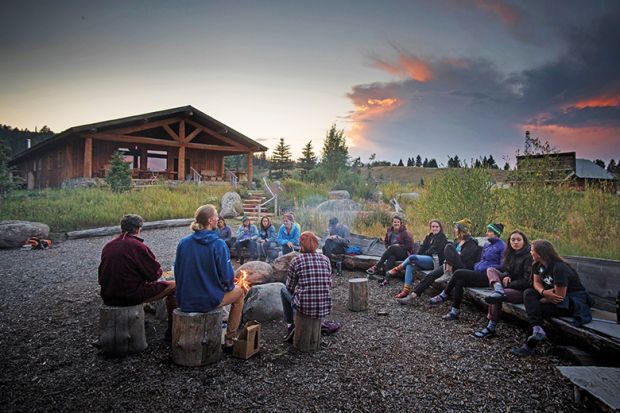A third-year undergraduate with an interest in environmental restoration, Kara Kornhauser always bristled when she read about the cutting and selling for profit of the majestic cedars, hemlocks, pines and firs that rise from America’s Pacific Northwest.
Then she sat down with members of the tiny native tribe whose reservation includes these trees and who depend for part of their income on harvesting them.
“That made me reconsider a lot of what I had previously thought about logging,” said Ms Kornhauser, 20, from Illinois.
It was an educational milestone for Ms Kornhauser and her classmates from Westminster College, who posed at the base of the world’s largest spruce tree after meeting with leaders of the 1,370-member Quinault Indian Nation. Then they got back into their vans and headed to the next destination on their 12-week road trip around the American West.
The expedition is an example of a new push by some residential US universities to emphasise the things they can offer students that new, competing means of education, such as online courses, can’t.
These include not only experiences such as this semester-long, intensive expedition, but also undergraduate research, study abroad and internship programmes, all of which are growing in the US.
“It’s a really phenomenal model,” said Lisa Gentile, provost of the private institution in Salt Lake City, Utah, of what the university calls its Westminster Expedition. “Whenever you can fit in an experiential learning opportunity, the better off the students are going to be.”
Forgoing cyberspace and classrooms for the very real world, the programme packs 14 students, two academics and a course administrator into two vans pulling trailers stuffed with camping equipment and textbooks. They study environmental cooperation and conflict, history and issues facing native tribes, while visiting national parks, copper mines, indigenous reservations, wildlife refuges, dam sites and even the area in Nevada where nuclear devices were tested.
“There’s no shortage of truly wicked problems we could show them,” said Jeff Nichols, a professor of history and co-director of Westminster’s Institute for Mountain Research, who is one of the faculty members on the trip.
Students visit Lake Coeur d’Alene in Idaho, for instance, a picturesque place threatened by pollution from the silver, lead and zinc mining that used to take place upriver. “But we also talk to people who are working cooperatively and selflessly to try to find solutions to those problems,” Professor Nichols said.
In a country with a population split on many issues, he said, “the idea was to bring students into the field and show them some extraordinary places, have them meet people who live in those places and talk to them face to face".
“They’re talking about community. They’re talking about the power of living in a place and caring about it and making all kinds of connections across the divides.”
That is very different from listening to a lecture back on the campus in Salt Lake City, where there are 2,100 undergraduates, then heading to the dining hall or gym, Ms Kornhauser said.
The group visited Little Bighorn, for example, site of a battle in which Native Americans defeated the US cavalry under the command of George Armstrong Custer. Their guide was a descendant of one of the fighters.
“In the classroom, I’d just be hearing a bunch of facts,” Ms Kornhauser said. “But we were on the battlefield, getting a sense of perspective. I’m processing things differently than I would be sitting at my computer or hanging out with friends on campus. The stories mean so much more when you’re standing in the place.”
Long-term expeditions like this aren’t for everyone. Westminster’s costs $6,839 (£5,189), although students do not have to pay for room and board for the semester on the campus. There’s a lot of driving, in close quarters; students and faculty alike joke that the vans begin to smell after a while. There is often no internet or even mobile phone signal. And the itinerary is planned so that they travel south as colder weather sets in.
But some of these are good things, too, Ms Kornhauser said. In the vans or around a campfire, “we can share our different experiences of the places we’ve just been, rather than just going to class and having our own thoughts and moving on”.
And it’s hard to beat the scenery, which, unlike the view outside a classroom window, changes every day.
“It’s amazing,” said Ms Kornhauser, just back from a hike in the Cascade Mountains that is part of the environmental section of the programme. “There are just no words.”




